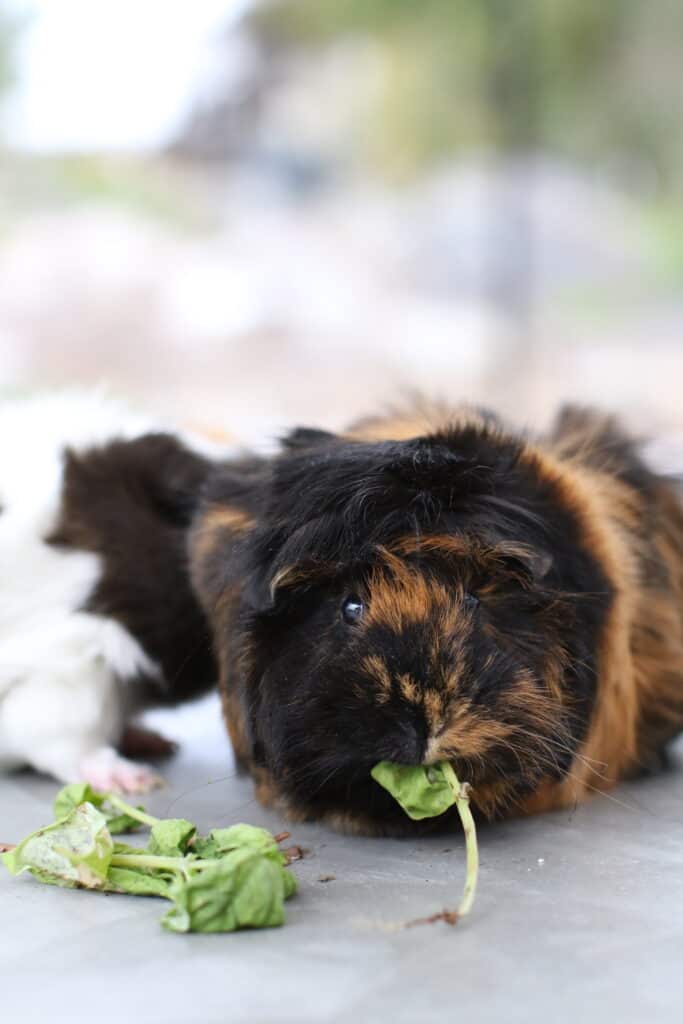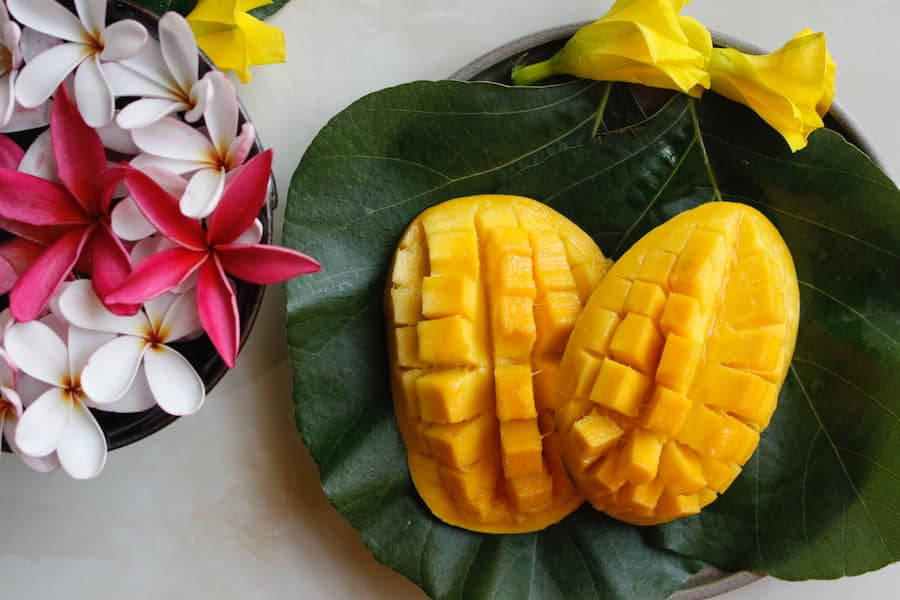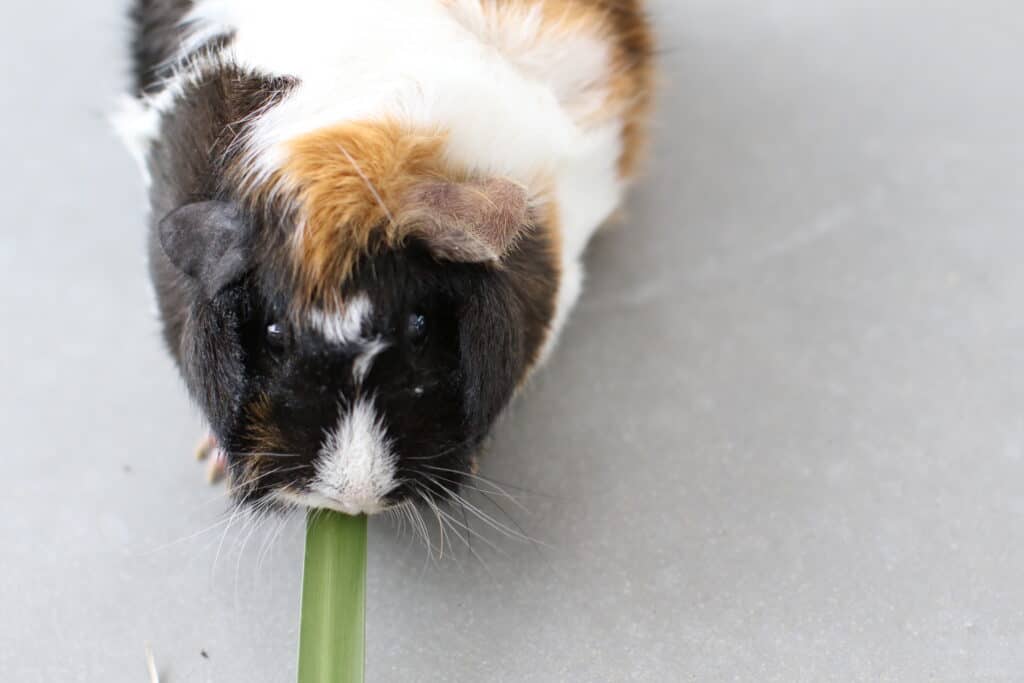As an Amazon Associate we earn from qualifying purchases.
Imagine a cute and healthy guinea pig nibbling veggies and fruits, it looks adorable, right? While it was well-known for guinea pigs to love green leafy vegetables, a lot of people ask if they can eat all kinds of fruits or mango in particular. Can guinea pigs eat mango? Well, here is the answer to the question!
Can Guinea Pigs Eat Mango?
Guinea pigs can eat mangoes! In fact, eating a mango will be satisfying for guinea pigs because of its soft texture and delicious taste. Just remember to avoid feeding them too many mangoes as this will promote health risks rather than benefits.

Mango is a sweet and juicy fruit that can be irresistible for guinea pigs. They could entice you into giving them more. Making sure that they are fed in proper amounts will not just assure their safety but also improve their health as well.
Mango Health Benefits to Guinea Pigs
Eating a mango can satisfy your fruit cravings while promoting health and wellness.
Mangoes are famous for their sweet taste and as most people know, they are packed with vitamins and minerals that are healthy for the body. Here is a list of the vitamins and nutrients found in mangoes:
- Vitamins C – mangoes have high amounts of vitamin C which helps guinea pigs to boost their immune system to fight against common diseases and infections. Guinea pigs are known to have Scurvy, which is a health condition that occurs when there is a lack of vitamin C in their systems. Eating mangoes will help them supply the needed vitamin C in their bodies.
- Vitamin A and vitamin B-6 – mangoes have vitamin A as well as vitamin B-6 that helps with guinea pigs’ growth, promotes better gut work, and aids their metabolism.
- Calcium – mangoes contain calcium which is a nutrient particularly needed by guinea pigs for their bone development. Calcium is vital for pregnant guinea pigs too.
- Antioxidants – mangoes are rich in antioxidants which helps with cell damage and antioxidants are known to fight free radicals that cause infection and long recovery in injuries.
- Fiber – mangoes have fiber which is famous for its efficiency in promoting digestive Health. Fiber is a vital nutrient for guinea pigs since their diet is mostly composed of grass and hay.
Health Risks in Mango Eating for Guinea Pigs
Mangoes can be helpful for humans and for guinea pigs to have well-balanced and healthy body systems. With the number of benefits that mangoes can offer to guinea pigs, few people might be thinking that it is safe for them to eat this sweet juicy fruit every day as a part of their diet. However, eating too many mangoes can impose health risks for them.
Guinea pigs are known for their sensitive bodies and that goes the same for their internal body systems. Giving them high amounts of nutrients will not help better their systems but damage them instead. With this, people should understand the health risks and hazards that guinea pigs can be exposed to due to mango feeding.

Health Risks and Problems
There are a number of health risks and problems that may arise due to continuous mango feeding. These problems commonly occur because some of the mangoes’ nutrient content could have a negative effect on guinea pigs’ health.
For instance, too much calcium intake could lead to urinary infections as well as kidney and bladder stones. In addition, high sugar and fat content can also promote various diseases in guinea pigs such as obesity and diabetes which can deteriorate their physical health as well as their personal hygiene habits and lifestyle.
The health risks that mangoes can impose on guinea pigs are dangerous. Oftentimes, urinary infections and weight problems such as obesity and diabetes can lead to death.
Mango Preparation Health Hazards
There are a lot of things to consider when feeding mangoes to guinea pigs. Mangoes contain a lot of health hazards for them which varies depending on the food preparation. To prevent fatal accidents and mistakes from occurring, people must understand the proper way of feeding mangoes to guinea pigs. Here are some tips and guides to mango feeding:
- Mango skin and seed are definitely a no-go for guinea pigs to eat. These parts are hard for them to chew or nibble on and is considered as a choking hazard. Refrain from offering them mango skin and seed as well as accidentally giving them one during mango feeding as it can be fatal for them.
- Dried mangoes and mango juice are not suitable for guinea pigs to eat. These mango products have undergone a strenuous process in order to extract most of the taste and sweetness of the fruit. It contains too much sugar and is considered unsafe for guinea pigs.
- Processed mangoes such as canned mangoes and frozen mangoes should be avoided too. Always feed guinea pigs ripe fresh mangoes.
- Lastly, mango leaves are safe for guinea pigs to eat. However, not all guinea pigs will want to eat their mango leaves due to its taste.
Overfeeding mangoes to guinea pigs
Overfeeding mangoes are the main reason for the health risks and problems that might affect your guinea pigs’ health. Mangoes, when consumed in the right amounts, are proven to give benefits for them. It might be hard to control the urge to give them more since they will absolutely love to have as many mangoes as they can but always remember that too much mangoes are harmful to them and it can lead to fatal health diseases and infections.
Guinea pigs’ diet should be 80% hay, 10-15% vegetables, and only 5% fruits. Thus, it is unnecessary to feed them fruits every day. Guinea pigs should only eat mangoes at least once a week due to their high sugar content. Also, offering them a wide variety of fruits every month can boost their mood so it is advisable to feed them different fruits alternately every week.

Related Questions
What Foods are Poisonous to Guinea Pigs?
Do not feed your guinea pigs chocolate, food with caffeine content, mushrooms, bulb plants, avocados, potatoes, nuts, as well as meat and dairy. These foods are poisonous for them to eat.
Can Guinea Pigs eat Pineapple?
Guinea pigs can eat pineapples but they should be served in moderation quantity. Pineapples are rich in vitamin C which is good for guinea pigs’ health and immune system. However, do not feed them pineapple juice since it is high in sugar content.
Conclusion
Guinea pigs can eat mangoes. Mangoes offer numerous vitamins and minerals that are vital for guinea pigs’ health and immune system. However, mangoes can also impose health risks and problems for guinea pigs due to overfeeding and other feeding hazards.
Thus, it is necessary to consider proper food preparation and moderate feeding to avoid health problems and risks.